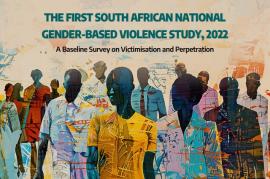
A study on gender-based violence (GBV) has revealed that about 7 310 389 million women, aged 18 years and older, have experienced physical violence in their lifetime.
This as the first South African National Gender-Based Violence Prevalence Study: A Baseline Survey on Victimisation and Perpetration, conducted by the Human Sciences Research Council (HSRC), was released at a media briefing held in Pretoria on Monday.
The study presents findings of the first national study on the prevalence of gender-based violence in all nine provinces of South Africa. It outlines the prevalence of physical, sexual, emotional and economic violence, as well as psychological abuse such as controlling behaviours among youth and adults 18 years and older.
The study also examined the perpetration of violence by men against their female partners and the underlying role of gender norms in driving GBV.
The study was presented by HSRC Research Director, Dr Nompumelelo Zungu, and it revealed that lifetime physical violence was significantly higher among Black African women with 35.5%, compared to women of other race groups.
“Lifetime physical violence was also significantly higher among women who were cohabiting but not married [43.4%] compared to women who were currently married and women who were not currently in a relationship,” Zungu said.
On the prevalence of lifetime sexual violence – regardless of partnered status - the study found that an estimated 2 150 342 million women nationally had experienced sexual violence in their lifetime, and this was significantly higher among women who were cohabiting but not married [14.9%], compared to women who were currently married [8.5%].
The study also showed that 35.5% of women reported experiencing lifetime physical and/or sexual violence during their lifetime.
“This translates to an estimated 7 847 438 million women who experienced lifetime physical and or sexual in South Africa.
Lifetime physical and/or sexual violence was significantly higher among women aged 35 – 49 years than those aged 50 years and older.
“Black African women were the most affected compared to other race groups. A higher proportion of women who were cohabiting but not married reported experiencing lifetime physical and/or sexual violence, compared to women who were currently married and those who were not currently in a relationship,” Zungu said.
Physical, sexual violence in the past 12 months
In addition to measuring lifetime experiences of violence, the survey measured recent experiences of GBV which are defined as experiences of some form of GBV victimisation in the past 12 months.
About 1 536 729 million women reported that they had experienced either physical and/or sexual violence in the past 12 months, while about 1 338 336 million reported that they had experienced physical violence in the past 12 months, and 432 525 reported that they had experienced sexual violence in the past 12 months.
On physical intimate partner violence (IPV) – victimisation among women - the study found that an estimated 3 221 649 million of ever-partnered women reported experiencing physical violence by a partner in their lifetime.
Zungu noted that lifetime physical IPV was significantly higher among those who were cohabiting with a partner (22.4%) but not married compared to women who were currently married (18.5%).
Overall, an estimated 2 495 451 million of ever-partnered men reported perpetrating physical IPV towards a partner during their lifetime.
“The result shows that perpetration of lifetime physical IPV started early and was significantly higher among men aged 25-34-year-old [20.5%] and 35-49-year-old men [17.6%] compared to 18-24-year-old men [9.2%]. An analysis by marital status and living arrangements showed similarities to the IPV data of women.
“Lifetime physical IPV perpetration was higher among men who were cohabiting with a partner but were not married [24.5%], compared to men who had a partner and were not cohabiting [13.9%], and men who were currently married [15.4%],” Zungu said.
Recommendations
The study recommended that The Presidency, working with the Department of Women Youth and Persons with Disabilities, and civil society, be tasked with the role of convening key stakeholders to consensus building workshops or smaller focused sessions for the purpose of starting a broader dialogue aimed at developing a set of agreed-upon, actionable, evidence-based recommendations that are informed by the study results for the country.
“We recommend that interventions be implemented at individual, interpersonal, community, and societal levels. This approach can assist to address the complex nature of GBV and improve prevention efforts across society.
“A collaborative approach involving various stakeholders, including government departments and other organisations, is crucial for effective implementation,” Zungu said. – SAnews.gov.za


